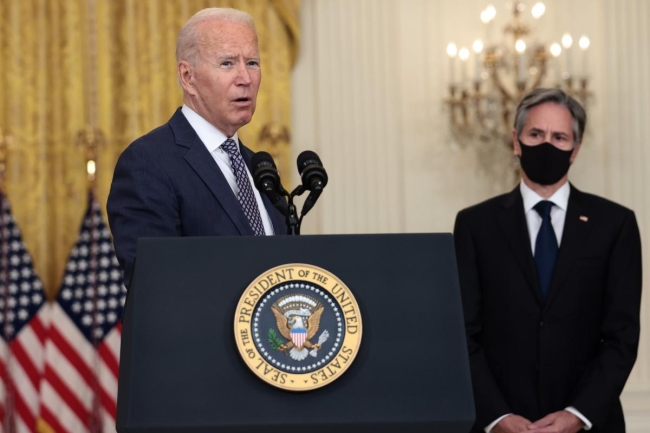You have /5 articles left.
Sign up for a free account or log in.

President Joe Biden and Secretary of State Antony Blinken (right) during a briefing Friday on the U.S. government’s evacuation efforts in Afghanistan.
Anna Moneymaker/Getty Images North America/Getty Images News
Efforts continue to rescue scholars, students and higher education personnel in Afghanistan following the Taliban takeover and the collapse of the Afghan government eight days ago.
President Joe Biden provided an update Friday on efforts to evacuate American citizens, third-country civilians, Afghan allies and vulnerable Afghans.
“We’ve secured the airport, enabling flights to resume, not just military flights but civilian charters from the other countries and the NGOs taking out civilians and vulnerable Afghans,” Biden said. “Now we have almost 6,000 troops on the ground … providing airport security. We’re going to do everything, everything that we can to provide safe evacuation for our Afghan allies, partners and Afghans who might be targeted because of their association with the United States.”
Leslie Schweitzer, a member of the Board of Trustees for the American University of Afghanistan and president of Friends of AUAF, a Washington, D.C.-based nongovernmental organization, said the university is "constantly in the process of arranging flights to get our students out of the country. It seems the most feasible timeline will be to get the majority of them out … after all Americans are evacuated, and then we can have access to the military flights, although we’re continuing to try to arrange private charter flights."
Schweitzer said Friday that only a few students have gotten out so far. The biggest challenge, she said, is safely getting them from their homes to the side of the airport controlled by U.S. military personnel.
"We don't want them coming to the airport until we know we have a plane," she said. "The difficulty is the vulnerability of people going to these various gates to try to get through with the Taliban in control. It's dangerous and it’s unpredictable, and we don’t want to put our students into those kinds of positions of danger until we are assured that there will be a plane."
Schweitzer said the evacuation efforts have been frustrating.
"We were expecting a plane today to get more out, and they have not been granted the ability to land," she said Friday. "This is not unusual. This is the way we’ve been spending our week."
Schweitzer said the university, which was established in 2006 and has received more than $100 million in funding from the U.S. Agency for International Development, has "a very long list of people who work for us, who we know are vulnerable" that it wants to evacuate, including students, faculty, national staff and their families.
“I will say we are a huge priority for USAID because we are the largest single institution that they have supported in Afghanistan and they have been working day and night to put visas together in order to accommodate our needs to get them out of the country as soon as possible,” she said. “Everybody is working tirelessly, and we think we’ve made progress, and then we come to the gate that the Taliban are controlling and we can’t get people through.”
Schweitzer said AUAF has entered into agreements with a number of other educational entities, including the American University of Iraq; the American University of Central Asia, in Kyrgyzstan; Education City in Qatar; and Bard College, in New York State, all of which have agreed to house AUAF students. The campus in Kabul has been occupied by the Taliban.
Academic groups in the U.S. are seeking to mobilize support for Afghan scholars and students.
A letter organized by the Scholars at Risk Network and signed by more than 1,000 people urges the U.S. government to take immediate action to help, including by continuing evacuation flights "for as long as possible so as to include scholars, students and civil society actors who have supported the forward-looking, pluralist vision of Afghanistan that the US mission embraced."
“We are racing to offer assistance to colleagues in Afghanistan who at this moment are desperately seeking ways out of the country,” the letter states. “Many have already moved into hiding and may soon take the perilous step of looking for a way over land borders. They may not have worn a uniform or received a U.S. government paycheck, but for the better part of twenty years they have fought alongside U.S. interests for a new, rights-respecting, forward-looking, knowledge-based Afghanistan. Hundreds of them traveled to the United States to seek an education and returned to their homeland, dedicated to values of openness, and tolerance. These are not the values of the Taliban, so their lives are now at risk.”
The letter calls on the government to take steps to ease visa processing for Afghans, include by advising U.S. embassies and consulates to process visas for Afghan nationals; creating a priority processing pathway for individuals who can demonstrate they have a host institution, job or sponsor in the U.S.; and waiving the requirement for exchange visa applicants that they demonstrate an intent to return home. In absence of such a waiver, the letter asks the State Department to “issue authoritative guidance to consular and border officials supporting a determination of satisfaction of the intent to return by showing a willingness to return in the absence of the Taliban, or a credible, durable and rebuttable demonstration that the individual would be able to return and live safely under the Taliban.”
The letter also calls for the government to “establish a dedicated funding stream for scholars, students, and civil society actors from Afghanistan, including men and especially women and ethnic and religious minorities, to undertake study, fellowships, lectureships, researcher positions or temporary academic positions at U.S. higher education institutions, similar to the programs created during the Iraq conflict but on a much larger scale reflective of the much larger threat posed by the military withdrawal and subsequent collapse of the Afghan national government.”
Scholars at Risk, which helps scholars who are threatened in their home countries find fellowships abroad, reported Friday that the organization had received inquiries from nearly 150 higher education institutions interested in supporting Afghan students or scholars in some capacity, including more than 30 institutions that have funding and close to 30 that are exploring possible funding options.
The Institute of International Education is also mobilizing support through its Scholar Rescue Fund, another program that provides fellowships at international institutions for scholars threatened in their home countries.
Allan Goodman, IIE's president and CEO, said the Scholar Rescue Fund has received many requests for help. Program staff are referring any requests they get -- regardless of whether they’re from qualified scholars or not -- to the State Department for its various evacuation lists.
Goodman said that as of Sunday morning the Scholar Rescue Fund had made seven emergency grants to Afghan scholars, and he expected "there will be a flood of more requests for help this week."
The difficulty again is in people getting safely to the airport.
“Our government forces are figuring out safe ways to get people to the airport and into the gates -- none of us can second-guess that,” Goodman said. “They’re doing all they can, and some people are making it.”
IIE also offers an Artist Protection Fund and an emergency student fund for international students already in the U.S. whose home countries are in crisis. The organization announced last week that it was accepting nominations for emergency student funding from institutions in its network for up to five international students from Afghanistan or Haiti, which was struck by a 7.2-magnitude earthquake earlier this month.
Ronald Hugar, a former associate professor of English at the American University of Afghanistan, said it’s important to extend evacuation opportunities not just to students and scholars but also to other higher education personnel and their families.
“What will happen to maintenance and other staff is unclear at present,” Hugar wrote in a letter to the editor he submitted to Inside Higher Ed in which he encouraged academics to ask their college leaders to pressure the Biden administration to include support staff on evacuation lists.
“All the schools and organizations that supported international higher education in Afghanistan have an obligation, in my opinion, to muster as much influence and power as possible to insure their safety after their service to higher education and the people of Afghanistan.”








